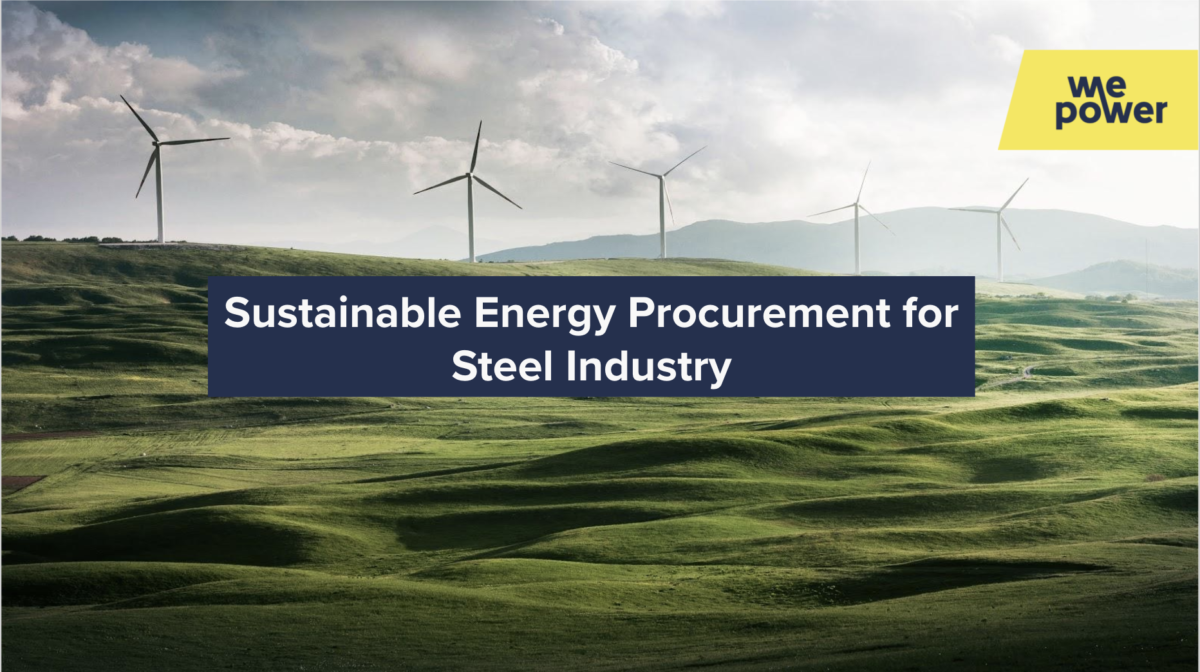pv magazine Australia: WePower‘s Marketplace has the potential to form part of the connective tissue between the coal intensive steel manufacture of the past, and a future Australian green steel industry for domestic use and export. How can we make this transition and what role can WePower play?
Harley Tempest, Head of Sales, WePower Network: WePower connects steel manufacturers directly with renewable energy producers. Steel manufacturers have a choice of renewable energy producers allowing access to local projects who are developing initiatives such as green hydrogen. By supporting local producers the steel industry will be financially supporting these projects and bringing green hydrogen into production sooner.
With most carbon-intensive industries based in NSW and QLD, and both states with long pipelines of renewable energy awaiting the development of Renewable Energy Zones (REZs), how does WePower see these manufacturing hubs integrating renewables?
The simple answer is, manufacturing does not need to wait for REZs to come into production, we have projects across all NEM states that can support industry now. Furthermore, with WePower acting as the “connective tissue”, we can provide the forum where these projects can market themselves directly to any interested manufacturer. This is significantly more efficient than one-to-one interactions, leading to more successful transactions.
What the REZs will do is open potential for larger scale hydrogen production, being conveniently close to existing steel facilities means the cost of transport will be lower, ultimately benefitting the steel industry.

Image: WePower Network
Whyalla Steelworks in South Australia is looking to be the largest producer of carbon-neutral steel by 2030, using hydrogen produced via electrolysis from its Cultana Solar Farm. Is Whyalla establishing the precedent of how the steel manufacturing industry can transition as a whole?
South Australia is a consistent leader regarding renewable energy, Whyalla Steelworks is one of many initiatives underway for hydrogen production.
Whyalla Steelworks is certainly leading the way, their capacity enables the potential of producing in-house green steel initiatives. Many smaller steel processing facilities won’t have the capability and/or capacity to produce their own hydrogen, as such they will rely on external sources for their smelting activities making it even more critical to support local solar projects capable of producing hydrogen.
The WePower Marketplace has the potential for various types of contracts/agreements between green energy producers and consumers. Could you describe some of these contracts and where they find use?
Out of our three contract options two are the main standouts.
Virtual PPAs – Are for larger energy consumers to access renewable energy consumers directly. This flexibility means the steel producers can access projects that are local and have the potential for hydrogen production – therefore supporting the transition to green hydrogen solutions.
Although generally considered the best return over the long term they do come with risk. Virtual PPAs carry a variable cost structure with returns dependent on the wholesale market rate. If the wholesale market collapses (as seen with Covid-19) the steel producer may be paying more than their contracted rates for a period of time before the market recovers.
Retail PPAs – These are generally considered to be the safer option. Retail PPAs still provide the benefits of a Virtual PPA with access to renewable energy projects with the added security of a retailer carrying the risk of price variation and the steel producer will pay a fixed rate for the term of the agreement. Once again Covid-19 has pushed the wholesale market to all-time lows resulting in outstanding Retail PPA rates sometimes lower than Virtual PPAs; as such many businesses are choosing Retail PPAs as a short term option while the energy market recovers.
Could you tell us about some of the transitions already being facilitated by the marketplace?
WePower has been successfully transacting renewable energy PPAs since November 2019, facilitating a virtual PPA for Robinvale Solar Farm to a major energy retailer. Since that transaction the retailer has been working with WePower, developing Retail PPAs and selling the offering into the smaller consumer markets.
From a consumer perspective, our focus has shifted with the downturn of the energy market, more of our customers are engaging WePower for designing renewable energy contracts and then conducting RFP activities sourcing the best rates with the highest renewable coverage bundled into Retail PPAs.
What does the transition to green steel in Australia look like over the next five years? How much solar could be utilised by steel manufacture?
As more projects come online, the industry will look to find new uses for excess energy production (in particular solar). One of the key focuses will be how and what to do with the energy, naturally one of the biggest advantages will be the production of hydrogen.
As hydrogen production increases more carbon-heavy industries will look to capitalise on falling cost until a point of mass adoption.
Green hydrogen has a target rate of $2 per kilogram, indicating a minimal increase to current carbon-heavy energy rates. With government support, new Green Initiatives can be widely adopted with minimal cost implication to the steel industry while providing significant competitive advantage as a valuable green steel export.
As highlighted by Whyalla Steelworks, the implementation of green steel is not a cost-prohibitive exercise and will result in a boosted economy and a competitive advantage in the international market.
This content is protected by copyright and may not be reused. If you want to cooperate with us and would like to reuse some of our content, please contact: editors@pv-magazine.com.









3 comments
By submitting this form you agree to pv magazine using your data for the purposes of publishing your comment.
Your personal data will only be disclosed or otherwise transmitted to third parties for the purposes of spam filtering or if this is necessary for technical maintenance of the website. Any other transfer to third parties will not take place unless this is justified on the basis of applicable data protection regulations or if pv magazine is legally obliged to do so.
You may revoke this consent at any time with effect for the future, in which case your personal data will be deleted immediately. Otherwise, your data will be deleted if pv magazine has processed your request or the purpose of data storage is fulfilled.
Further information on data privacy can be found in our Data Protection Policy.